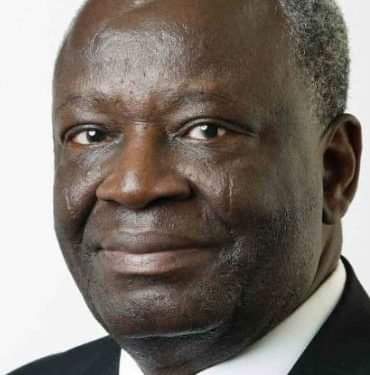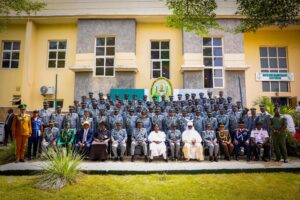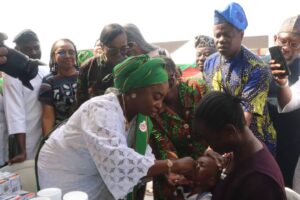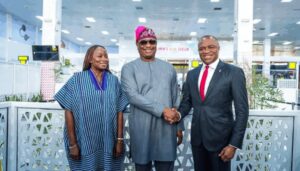
It is tough being a Nigerian. Every aspect of the Nigerian life, from the existential to the political is charged with presumptions and assumptions and suspicion. Buying anything on the street attracts deep anxiety; appointing anyone to any position draws deep skepticism.
And all these are to be expected in a state whose foundation was laid on historical animosity and current distrust. The present COVID-19 pandemic has already revealed the underbelly of Nigerian politics and its dynamics that have ensnared Nigeria in an underdeveloped mode for years.
Like many states all across the world, Nigeria was caught napping, and we have since been scrambling to make sense of a virus that has no sense. And in the middle of this crisis, politics reared its ugly head again. First, an objectionable Chief of Staff died.
And then another was appointed. Both incidences drew lengthy public discourse. And this is even more so because of what that office had become rather than what it ordinarily was created to achieve.
The chief of staff is the president’s chief servant; the chief of the president’s domestic staff. The person appointed to this office is meant to distil order and responsibility in the management of the president’s work schedules in ways that will enable him to attend to matters of state without getting bogged down by administrative matters that could best be handled by someone else, following the president’s explicit authority. But Nigeria is Nigeria. and almost everything is colored by the notorious “Nigerian factor.”
And this is why it was possible for the last chief of staff, an unelected public official, to arrogate too much political power on the mere administrative responsibilities the office demanded.
And this is why the appointment of another official became another issue of public concern, even in the midst of a more virulent national concern.
The appointment of Professor Agboola Gambari as the new chief of staff ordinarily ought to have been a celebrated one. This is no rookie public servant. He has had a long and meritorious public service record that is long and distinguished.
Yet, Prof. Gambari is a Fulani from Ilorin. And thus, such an appointment could not fail to raise issues in a state where everything is colored by ethnicity and religion.
And the reactions have been as scurrilous as they have been incisive. Prof. Gambari has been assessed both sentimentally and critically.
All this has been done within the ambit of the Nigerian political reality. However, such reality must be assessed on the basis of realistic assumptions.
The starting point of any understanding of the Nigerian state, indeed, the most significant point, is the reference to its diversity.
The statement that sees Nigeria as “a mere geographical expression” best captures the mechanical nature of our existence rather than the more vital sense of belonging that nationhood implies.
But then, diversity is not necessarily a curse. Nigeria is not the only state in the world that is plural and ethnically diverse. Some other states discovered the strength in their diversity, and that has constituted the ladder for developmental progress.
The choice has always been between national fragmentation or negotiated self-determination. Either of the options required that a state needs concerted efforts in rewriting her stories and histories.
There is the need for a national narrative that has all the national constituents weighing in on the direction such a state wants to take to achieve nationhood. Ultimately, such a narration depends on the capacity of leadership.
For the Nigerian leadership, the option of enacting a genuine federal arrangement that will creatively energize the comparative advantages of the federating parts towards the achievement of national development remains a protracted option we have not fully explored.
The leadership will has remained at best hesitant. Leadership in the Nigerian context, inexorably, has always been perceived in the ethnic guise—from Ahmadu Bello, Nnamdi Azikiwe and Obafemi Awolowo to Umaru Musa Yar’Adua, Olusegun Obasanjo and Goodluck Jonathan. And what makes this worse is the failure to tease out the capacity and willingness of these leaders to be truly Nigerian.
The real issue therefore, for Nigeria, is that of how to take stock of ethnic identities, assess its weaknesses and strengths, and transcend them in a process of national alchemy, to achieve the objective of pan-Nigeriana.
And this is where the appointment of Prof, Agboola Gambari becomes critical for my analysis. In the very personality of the new chief of staff, we have a dazzling professional competence and achievements warring with a debilitating ethnic identity.
In a recent interview after the announcement of the appointment, Prof. Gambari categorically declared that he owes allegiance not to the Nigerian public but to the president who appointed him.
This is a brilliant response to the extent that he is not elected and the remit of his responsibility is to the president whose domestic staff he is meant to coordinate. However, this does not absolve the new chief of staff from suspicion.
The late predecessor could also have given this same response, as demanded by the remit of the office. However, there is no mere office or status in Nigeria. messengers and clerks have been known to determine critical appointments!
This terrible dynamic led Abba Kyari to becoming a substantive surrogate to the elected president. What stops Gambari from following the same trajectory? Afterall, says that prophetic political scientist, Lord Acton, power corrupts, and absolute power corrupts absolutely.
Yet, what says that Prof. Gambari will also not rise above ethnic chauvinism and loyalty to become heroically patriotic in the face of daunting and experiential suspicion as well as the imperatives of national integration?
Who says that his ethnic identities—being Yoruba and Fulani—will not stir in him the option of being a bridge builder in the service of nation building in a country that is racked by ethnic rivalries that has made our diversity more of a curse than a blessing?
Prof. Gambari has a lot working against him; he also has a lot working in his favor. No human should be expected to discountenance the allure of egoism backed by power.
Thus, a 75-year old Gambari could still continue pursuing his selfish interest even when his long list of achievements has already placed him at the zenith of public office and its benefits. Or: the new chief of staff could add to his legacy by discounting personal and ethnic preferences for the sake of pushing the circumference of pan-Nigeriana.
And this he is able to do by simply staying strict to the administrative objective of his employer and principal.
It is easy to draw a correlate between the appointment of Gambari and the emergence of Obasanjo as the flagbearer of the PDP and later president of Nigeria in 1999.
This correlation is all the more so because the Yoruba have been the most vociferous in outlining the possibility of Agboola Gambari seeling out because of his ethnic duality. For them, he is more Fulani than Yoruba.
Obasanjo’s emergence as president was also seen in a similar light, as a loss rather than a gain not only to the Yoruba but also to the Nigerian project. Obasanjo’s travails and Gambari’s emergence raise a critical question: what makes any political elite or public official acceptable for diligent consideration within a context where ethnicity undermines all possibilities?
In other words, proper dose of primordial consideration and professional integrity could count for something worthwhile in Nigeria? This inquiry takes to task the implication of saying a person or public official is “detribalized.”
When Obasanjo emerged, he was touted as a detribalized Nigeria, and yet Nigerian believed he was pandering to the Hausa-Fulani interests. Gambari is being taken through the same prism of assessment too.
In appointing Prof. Agboola Gambari, it seems pointless to expect President Buhari to weigh in what proportion the new chief of staff is Yoruba and Fulani. What seems more cogent is to assess his credentials, loyalty and professional competence.
And this is someone who has seen almost every facet of public life. This is also someone with a good dose of international respectability and administrative loyalty. What more is expected? Well, there is more to be expected.
Prof. Gambari has never been chief of staff before, and the office holds significant allure as the late Abba Kyari demonstrated.
And so, we will just have to wait and see whether Prof. Gambari will be true to his public service professionalism, or whether he will give in to the ambivalent vagaries of power and go on to soil his good reputation and legacy.
I am certain he is Yoruba enough and sufficiently old and wise in years to understand that a good name is worth more as a companion in life and in the grave than the glitter of gold.
Professor Gambari Agboola has been given an opportunity, another opportunity I dare say, to extend his patriotic contributions to Nigeria, and indeed to achieve the coveted status of a statesman by helping the incumbent president to rehabilitate and extend the fortune of the Nigerian state and her citizens. We will wait to see whether he will be able to rise to this occasion.
Or else fall into the trap of selfishness like so many other Nigerians who have been consigned to the rubbish heap of historical and national ignominy.
⦁ Prof. Olaopa is a retired Federal Permanent Secretary & Directing Staff, National Institute for Policy and Strategic Studies (NIPSS) Kuru, Jos.












